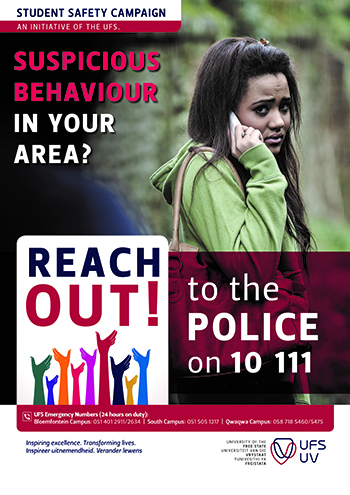
The University of the Free State (UFS), in collaboration with various stakeholders, has dedicated the week of 24 to 28 July 2017 to creating awareness for the safety of students on and around its campuses.
UFS and CUT unite for safety
The highlight of the week will be on Thursday 27 July 2017 when a safety awareness march will take place from the Main Building on the Bloemfontein Campus to the Bram Fischer Building, where a memorandum will be handed over to Mr Sam Mashinini, MEC for Police, Roads, and Transport in the Free State. The march is a partnership between the UFS Student Representative Council (SRC) and the Central University of Technology (CUT).
During a meeting on 24 July 2017, the Executive Committee of Senate granted formal approval for students and staff of the Bloemfontein Campus to take part in the safety march on 27 July 2017. For this reason, all lectures will be suspended from 11:00 to 13:00 on 27 July 2017 in order to give the campus community the opportunity to participate in the march. Academic staff, as well as staff in the administrative support services, are encouraged to join the march.
Programme for the safety march:
11:00: Marchers gather in front of the Main Building
11:15: Marchers depart from the Main Building to the Main Gate
11:30: Marchers exit the Main Gate and move towards the Central University of Technology (CUT). Students and staff who are unable to participate in the rest of the march, return to their work places or classes.
12:20: UFS and CUT marchers will gather at the Bram Fischer Building, situated on the corner of Nelson Mandela Avenue and Markgraaff Street. Here, the Rector and Vice-Chancellor of the UFS, Prof Francis Petersen, and the Vice-Chancellor and Principal of CUT, Prof Henk de Jager, will address the marchers, after which the memorandum will be read by the respective SRC Presidents and handed to Mr Mashinini.
Activities underway to raise safety awareness
During the week, the Student Representative Council (SRC), together with other stakeholders, have been involved in several activities on and off the Bloemfontein Campus, including door-to-door visits to student homes and residences on and around campus, awareness campaigns at all the gates of the campus, and a Safety Dialogue that will be held on Wednesday 26 July 2017 at the Equitas Auditorium. The aim of the Safety Week is to focus on informing, educating, and encouraging students as well as the Mangaung community at large, in order to work together in creating a safe environment for students.
The week started with the roll-out of an awareness campaign titled Reach Out, which is set to bring students and the community of Mangaung together to help decrease the number of violent crimes faced by students off campus. The communication plan includes safety messages, using outdoor billboards, posters on lampposts around the residential student areas, local community radio stations, campus media, and the university’s social media platforms.
A similar student safety awareness campaign will take place on the university’s Qwaqwa Campus during the week of 31 July 2017.